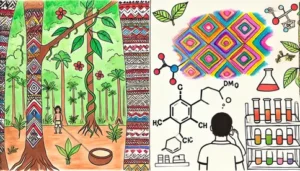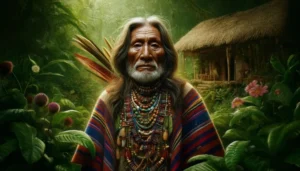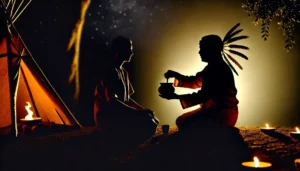Ayahuasca has been known as a catalyst for profound transformation, a bridge to deeper self-awareness and healing. But what happens when that bridge seems to lead nowhere for some individuals? Despite numerous encounters with this powerful medicine, a few may find themselves stuck to the same spot, as if transformation is a distant, flickering mirage. What stands between them and the change they seek?
Identifying these roadblocks is the first step toward ensuring you don’t find yourself in a similar standstill. In this exploration, we’ll delve into the intricacies of personal change, the possible reasons for stagnation, and strategies to ensure your journey with Ayahuasca leads to the growth and evolution you’re aspiring to.
Key takeaways:
- Change takes time, sometimes things are happening on the inside of a person that is not yet noticeable to people from the outside.
- It is an individual journey and there is no rule on home many Ayahuasca ceremonies you are supposed to do (or not do).
- It is important to implement daily, focused and continuous action in order for the internal shifts to become experienced reality.
Table of Contents
Difficult to have an objective view
Diving deep into personal growth often requires us to confront issues from every conceivable angle, and when it comes to Ayahuasca, this process is no exception. Consider the story of a friend of mine—someone I hold in high esteem—who isn’t a guide but a frequent participant in ceremonies. To some, his extensive engagement with Ayahuasca might raise eyebrows.
He once shared with me about a series of around thirty ceremonies that allowed him to finally navigate the complexities of his relationship with his father.
This was no overnight epiphany; it was an intricate process of introspection and revelation, where he wrestled with the issue from various perspectives until he reached a place of peace.
It’s noteworthy that since finding this resolution, he’s continued his journeys with Ayahuasca, turning his attention to other life areas without the topic of his dad coming up in the ceremonies.
From an outsider’s viewpoint, his frequent participation might seem questionable. However, judgment often comes from a place of limited understanding. Everyone’s path is uniquely their own, marked by different rhythms and timelines.
Just as it is unreasonable to dictate when someone should reach certain life milestones at a specific age, it’s equally imprudent to impose arbitrary limits on their healing journey.
Life is not a straight line; it ebbs and flows with complexity and subtlety, reminding us that our journeys are deeply personal and resistant to one-size-fits-all timelines.
How much are you integrating?
The path of integration after an Ayahuasca retreat is as critical as the experience itself. It’s a time for reflection, for considering not just the visions and emotions that surfaced during the ceremonies, but also how to embody the lessons learned in daily life. I recall an integration call where one individual reflected on his challenge to communicate more openly.
He observed his own hesitations and his tendencies to make excuses for withholding his truth. Yet he was also becoming more conscious of these moments, recognizing the patterns as they emerged—a crucial first step towards transformation.
Change doesn’t always manifest as immediate. More often, it’s a gradual shift, requiring patience and the willingness to encounter the same lessons repeatedly until they truly take hold.
On that same call, another person took a different route. Following the retreat, he seized the opportunity for a pivotal conversation with a relative over the phone. It wasn’t the ideal face-to-face exchange he had envisioned, but it was a proactive step, imperfect yet forward-moving, laying the groundwork for healing and understanding.
Indeed, the potency of the transformation that Ayahuasca can initiate is linked to the actions taken afterward. It’s in the doing, the everyday choices, and the commitment to step into the evolved version of oneself that a new reality is born.
The ceremonies may provide the insight, but it is in the integration—the embodiment of these insights through action—that true change is cultivated.
Must read Blog: How many Ayahuasca ceremonies do you need?
Example of falling back to old patterns
The journey of self-improvement and breaking free from harmful habits is often non-linear and fraught with setbacks. Take the example of smoking—a common vice that many strive to relinquish.
Picture someone returning from an Ayahuasca retreat, initially filled with a newfound repulsion for their old smoking habit. In the after glow of the retreat, they might find it easier to resist the urge, empowered by the emotional insights gained. However, as time progresses, and they find themselves amidst the familiar social circle of a party, the temptation to join in can be overpowering.
Succumbing to peer pressure, they might light up a cigarette, stepping back into the comfort of old routines.
This scenario poses several questions: Is it a failure of the Ayahuasca, a lack of willpower / consistency, or simply part of a longer, more complex process of change?
While some individuals may grasp a lesson instantly, others may need to face the same challenge repeatedly.
Each encounter with a recurring issue is not merely a setback; it’s an opportunity for deeper learning and a testament to the fact that maturation is an ongoing process.
When considering the efficiency of Ayahuasca or any transformative experience, it’s crucial to acknowledge the subtler shifts that occur beneath the surface.
These changes might not be immediately apparent to an onlooker, but they contribute to the gradual unfolding of a person’s evolution. It’s a gentle reminder that we’re all doing the best we can with the tools at our disposal. Often, there’s a yearning to be further along the path of growth than where we currently stand—a common human impulse.
Striking a balance between self-compassion and the honest acknowledgment of one’s progress, or lack thereof, requires introspection. Ultimately, deep down, you know for yourself what is the truth for you.
Judging others and feeling superior:
In the realm of personal growth, especially in contexts where Ayahuasca ceremonies are involved, a weird social dynamic can unfold. On one end of the spectrum, there’s a group that takes a sort of quiet pride in their limited use of Ayahuasca.
They firmly believe in doing the “real” work in their daily lives, outside of the ceremonial space. This group may view those frequently participating in ceremonies with a degree of skepticism or even disdain, suggesting that these individuals may be using the experience as a crutch or a superficial badge of effort, rather than as a tool for genuine transformation.
Conversely, there’s another faction that often indulges in ceremonies with a certain bravado. They carry an air of spiritual bravura, touting the number of their ceremonies as a measure of their enlightenment or fortitude. They might dismiss others as not being as dedicated or capable of navigating the profound journeys they have endured.
Both perspectives, however, are merely two faces of the same coin, perhaps even the same mechanism of ego trying to assert its dominance, to establish a hierarchy of righteousness within the healing journey. It’s a defensive posture, a game of one-upmanship where the ultimate prize is a sense of superiority over the other.
Yet, in the grander scheme of personal progress, such comparisons are trivial. The true measure of advancement isn’t quantifiable by ceremony counts or the lack thereof.
Real progress is about movement—sometimes it’s a seismic leap, and other times it’s a subtle shift, hardly noticeable to the outside observer. It’s not about the ego’s need to compare but about the individual’s internal compass pointing them towards growth. In this journey, every step counts, each one adding up over time, contributing to a larger, more comprehensive path forward.
It’s the accumulation of these steps, regardless of their size, that forges the path of genuine, enduring change.
Returning to Ayahuasca when you have not done your homework.
Each ceremony with the plant medicine can present a set of lessons, insights, or “homework” to be processed and integrated into one’s life. It’s a common recommendation for those walking this path to take these insights seriously and apply them to their lives, as this is where true transformation takes root.
Indeed, you are the master of your own journey, and the decision to return to Ayahuasca without having fully engaged with your previous lessons is yours to make.
It may well be that the same lessons will present themselves with greater intensity, or perhaps new insights will emerge that are more relevant to your present moment. The path of healing and growth is not strictly linear; it often requires revisiting lessons from different vantage points or at different times in one’s life.
The homework Ayahuasca assigns isn’t always straightforward or easy to implement. It might involve cultivating stronger boundaries, fostering a greater capacity for love in everyday interactions, or any number of other deeply personal challenges. While you might have made progress in some areas, there could be others where resistance or doubt has hindered complete fulfillment of these tasks.
This is where the next step of the work may lie. By recognizing where you’ve succeeded and where you’ve stumbled, a new intention can be formed for your next encounter with Ayahuasca.
You might focus on understanding the roots of your resistance, the nature of your missteps, and devising strategies to overcome these barriers. Ayahuasca can then become a partner in reflection, helping to show the hidden corners of your psyche and empower you to move beyond them.
If you are looking for a place to drink Ayahuasca, feel free to consider our Ayahuasca Retreat Guacamayo in Colombia.
My personal experience with many Ayahuasca ceremonies
“In my personal journey with Ayahuasca, I’ve learned the deeply individual nature of this path. My commitment to supporting others as they navigate their own experiences in the retreats I host is a role I take seriously.
My role necessitates partaking in Ayahuasca ceremonies more frequently than I might do solely for personal healing. This doesn’t lessen the insights and growth I gain from each ceremony.
Every session offers a new perspective, allowing me to confront my illusions and limitations and to learn from both plant medicine and the collective experiences of the participants I co-guide.
In 2022, I focused on creating better boundaries and improving how I communicate my expectations, desires, and needs. This ongoing process is significantly enriched by the continual feedback I receive from both daily life interactions and Ayahuasca’s teachings.
It’s a dynamic interplay; understanding when I’ve been too rigid or failed to express my boundaries and deciphering why helps me to gradually unravel long-established patterns. This process is facilitating a profound rewiring of behaviors that have been with me for years, perhaps even decades.
This journey of mine mirrors the experience of my friend, who deeply explored his relationship with his father through Ayahuasca. It highlights a fundamental truth: there is no set number of ceremonies one needs.
We each must follow our intuition and trust where it leads us, recognizing that each person’s path is unique and that the real measure of progress lies in the depth of understanding and the extent of integration that follows our experiences.”
Must read blog: What Ayahuasca taught me – 19 life lessons
Going back to the basics:
Returning to the core principles of personal growth and spiritual development, it’s crucial to understand that the journey doesn’t solely revolve around experiences like Ayahuasca ceremonies. Indeed, these experiences can be profound and life-altering, yet the true test and opportunity for transformation often lie in what many refer to as the “ceremony of everyday life.”
The questions that guide us in our day-to-day existence are vital in assessing our progress and maturity. For instance:
- Reaction vs. Response: Do I tend to react impulsively to triggers or respond thoughtfully?
- Past vs. Present: Am I dwelling on past events, reinforcing unwanted emotions and situations, or living in the present moment?
- Treatment of Others: How do I behave towards those close to me, as well as those who cannot benefit me in any way?
- Self-Compassion: Am I overly critical of myself, or do I practice compassion and understanding towards my own faults and failures?
- Emotional Stability: How much control do I have over my emotions, and how stable do I feel in varying circumstances?
- Life Progression and Vision: Do I have a clear direction in life, a vision that guides my actions and decisions?
- Enjoyment of Life: Am I able to appreciate and enjoy the present moment?
- Self-Care: How well do I care for my mental and physical health?
These aspects, among many others, are key determinants of our emotional, physical, and spiritual well-being. It’s about becoming mindful of our habits, the environments we frequent, and the nature of our conversations, regardless of the number of Ayahuasca ceremonies we’ve participated in.
Intentionality in actions and daily life is crucial. Focusing on gratitude for the present blessings in life, assessing whether we are genuinely giving our best effort or simply making excuses, and incorporating a consistent spiritual practice are all integral parts of this journey.
If you find that these elements are lacking in your life, it’s important to ask why. Radical honesty with oneself can unlock profound insights and pave the way for meaningful change.
This approach goes beyond the boundaries of any ceremony or retreat—it’s about the continuous, conscious effort to grow, evolve, and become the best version of oneself.
Must read Blog: Ayahuasca Integration – how to maintain the magic of Ayahuasca
What are your beliefs about yourself?
Diving deeper into the intricate relationship between our self-perception and daily actions, it’s clear that our beliefs about ourselves play a pivotal role in shaping our reality. The way we see ourselves—our self-identity, self-worth, and the truths we hold about our capabilities and value—fundamentally influences our habits, patterns, and responses to life’s varied situations.
It’s crucial to regularly examine and question these beliefs. This introspection is a topic rich in depth and significance. In my experience, there are two critical aspects to consider:
- Inner Beliefs: These are the convictions we hold about ourselves deep within our psyche. They are often formed through past experiences, societal conditioning, and personal reflections. Our inner beliefs set the stage for how we perceive and interact with the world around us.
- Outer Actions: Interestingly, our external actions also significantly impact our inner beliefs. Engaging in behaviors and activities that a person with high self-esteem would do can provide tangible, physical evidence of our self-worth. This, in turn, positively influences our inner belief system, creating a virtuous cycle of self-confidence and worthiness.
By aligning our inner beliefs with empowering actions, we can progressively build a stronger sense of self-worth and self-esteem. This alignment is essential for personal growth and spiritual development, as it influences every aspect of our lives, from our personal relationships to our professional endeavors.
For those interested in exploring this topic further, particularly in the context of Ayahuasca’s potential to enhance self-image, I recommend visiting this article: Ayahuasca and self – worth – how to boost your self – image.
Remember, understanding and reshaping our self-beliefs is an ongoing journey, one that can lead to profound personal transformation and a deeper connection with our true selves.
Conclusion
In summarizing the impact of Ayahuasca on personal transformation, it’s crucial to understand that profound change is a nuanced and individual process. While Ayahuasca can offer deep insights, the true test of transformation lies in integrating these revelations into daily life.
This integration demands more than just intention; it requires consistent effort and the application of new understandings in everyday situations.
Change is rarely straightforward or immediate. The journey often involves setbacks and revisiting old patterns, which should not be seen as failures but as part of the natural growth process.
Transformation, therefore, is less about the quantity of ceremonies attended and more about the quality of one’s actions and commitment to personal development post-ceremony.
In essence, the key to lasting change after Ayahuasca lies in persistent, conscious effort to apply the insights gained in all aspects of life, embracing both the challenges and triumphs of this ongoing journey of self-evolution.
FAQs:
Why do some people not change after many Ayahuasca ceremonies?
Some people do not change after many Ayahuasca ceremonies because they are not fully ready for it internally. They are still attracted to their victim mentality. Another explanation is that they are in their maturing process, and there are actually a lot of things shifting inside the person, but maybe not as observable for an outsider.
It is interesting to note that many times things that bother us about others are actually something that bothers us about ourselves… (Just a little food for thought.)
What is the key to change after Ayahuasca?
The key to change after Ayahuasca is to actually take steps in your external, outer reality. There is a habit that does not serve you. Then stop it. There is a conversation that you need to have. Then go have that conversation.
We can overcomplicate life a lot, but in the end, it also comes down to the basics: executing, revising what worked well, identifying what needs to be improved, and then taking the next step.





